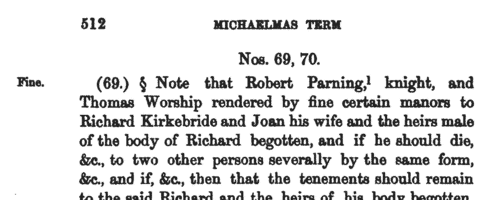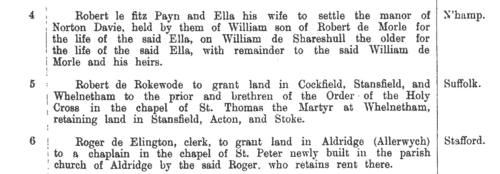Rydel Surname Ancestry ResultsOur indexes 1000-1999 include entries for the spelling 'rydel'. In the period you have requested, we have the following 16 records (displaying 11 to 16): Buy all | | | Get all 16 records to view, to save and print for £78.00 |
These sample scans are from the original record. You will get scans of the full pages or articles where the surname you searched for has been found. Your web browser may prevent the sample windows from opening; in this case please change your browser settings to allow pop-up windows from this site. Norfolk Feet of Fines
(1196-1307)
Pedes Finium - law suits, or pretended suits, putting on record the ownership of land in Norfolk. These abstracts were prepared by Walter Rye.RYDEL. Cost: £4.00.  | Sample scan, click to enlarge

| Close Rolls
(1313-1318)
The close rolls of the 7th, 8th, 9th, 10th and 11th years of the reign of king Edward II record the main artery of government administration in England, the orders sent out day by day to individual officers, especially sheriffs of shires: they are an exceptionally rich source for so early a period. In amongst this official material, the rolls were also used as a way of recording many acknowledgments of private debts and contracts between individuals. Most of the contents relate to England, but there are also entries concerning Wales, Scotland, Ireland and the English possessions in France.RYDEL. Cost: £4.00.  | Sample scan, click to enlarge

| Grantees of offices, commissions and pardons
(1317-1321)
The Patent Rolls are the Chancery enrolments of royal letters patent. Those for the 11th to the 14th years of the reign of king Edward II (8 July 1317 to 7 July 1321) were edited for the Public Record Office by G. F. Handcock, and published in 1903. The main contents are royal commissions and grants; ratifications of ecclesiastical estates; writs of aid to royal servants and purveyors; and pardons. Most extensive are the commissions of oyer and terminer to justices to investigate complaints about specific crimes and wrongs in particular counties.RYDEL. Cost: £2.00.  | Sample scan, click to enlarge

| Suitors in the king's courts
(1342)
Year books containing reports of English law cases survive from 1220 onwards: they contain descriptions of difficult legal cases and decisions, and as such give the names of parties to the cases, but few other names. The Year Book for Trinity Term in the 16th year of the reign of king Edward III was republished in 1900 as part of the Chronicles and Memorials of Great Britain and Ireland during the Middle Ages, edited and translated (from the Anglo-French) from manuscripts in the Temple, Lincoln's Inn and the British Museum (Harley 741 and Additional MSS 16560 and 25184) by Luke Owen Pike.RYDEL. Cost: £4.00.  | Sample scan, click to enlarge

| Landowners and tenants in Norfolk
(1345-1485)
Inquisitions ad quod damnum were held by the appropriate sheriff or escheator (or other officer in whose bailiwick the matter in question might lie) to investigate cases in which the royal or public interest might be damaged by proposed alienation or settlement of land (especially alienation to religious uses, into mortmain). The key findings from these inquisitions were as to the tenure of the land and the service due from it; its yearly value; the lands remaining to the grantor, and whether they sufficed to discharge all duties and customs due from him; and whether he can still be put upon juries, assizes and recognitions, so that the country be not burdened by his withdrawal from them. Generally speaking, this process had the makings of a system of licensing such alienations, and raising money in proportion to the valuations. Equally, there are many items that deal with subjects such as the closing of public roads, the felling or inclosing of woods, or the proposed grant of liberties or immunities. A calendar of these inquisitions from the 19th year of the reign of king Edward III to the 2nd year of Richard III was prepared by the Public Record Office and published in 1906. We have now indexed this calendar by surname and county. Most of the individuals appearing in the calendar are either pious individuals seeking to make grants to religious bodies for the sake of their souls; or landowners securing the disposition and settling of their real estate. But some other names do appear - tenants, trustees, chaplains and clerks.RYDEL. Cost: £6.00.  | Sample scan, click to enlarge

| Long-stay Paupers in Workhouses: St James Westminster
(1861)
This comprehensive return by the Poor Law Board for England and Wales in July 1861 revealed that of the 67,800 paupers aged 16 or over, exclusive of vagrants, then in the Board's workhouses, 14,216 (6,569 men, 7,647 women) had been inmates for a continuous period of five years and upwards. The return lists all these long-stay inmates from each of the 626 workhouses that had been existence for five years and more, giving full name; the amount of time that each had been in the workhouse (years and months); the reason assigned why the pauper in each case was unable to sustain himself or herself; and whether or not the pauper had been brought up in a district or workhouse school (very few had). The commonest reasons given for this long stay in the workhouse were: old age and infirm (3,331); infirm (2,565); idiot (1,565); weak mind (1,026); imbecile (997); and illness (493). RYDEL. Cost: £6.00.  | Sample scan, click to enlarge

|
 | 1 | 2 |
Research your ancestry, family history, genealogy and one-name study by direct access to original records and archives indexed by surname.
|








